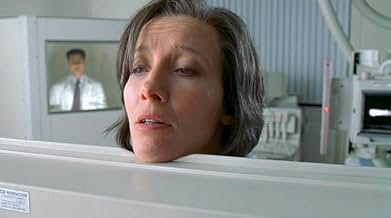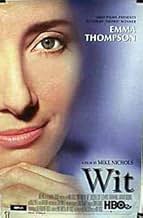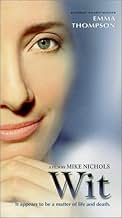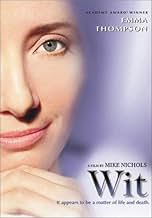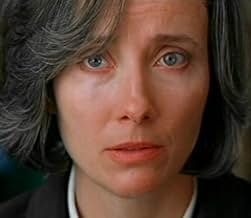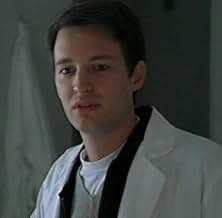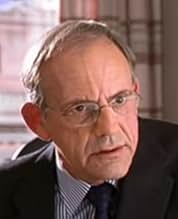Adicionar um enredo no seu idiomaA renowned professor is forced to reassess her life when she is diagnosed with terminal ovarian cancer.A renowned professor is forced to reassess her life when she is diagnosed with terminal ovarian cancer.A renowned professor is forced to reassess her life when she is diagnosed with terminal ovarian cancer.
- Direção
- Roteiristas
- Artistas
- Ganhou 3 Primetime Emmys
- 13 vitórias e 21 indicações no total
- Nurse
- (as Su-Lin Looi)
- Fellow 1
- (as Harry Dillon)
- Direção
- Roteiristas
- Elenco e equipe completos
- Produção, bilheteria e muito mais no IMDbPro
Avaliações em destaque
By Blake French:
"Wit" is one of the most personal stories of terminal illness that I can remember. Most of the movie takes place behind hospital doors where the film's main character is tested and treated for advanced stages of ovarian cancer-that may be the reason that it was released straight to cable TV instead of getting a much deserved theatrical release. Do not let the depressing themes stop you from viewing "Wit," it is thought-provoking, riveting, unforgettable-one of the best movies of the year.
The film is directed by Mike Nichols (whose most memorable work is the original classic, "The Graduate"). He is at the top of his game here, vividly focused and, working for a script by himself and Emma Thompson, uses a narrative of the first person. The main character, a strict professor of poety in her upper forties named Vivian Bearing, often talks directly to the camera, incorporating a straightforward point of view as she shares her personal feelings directly. This gives the movie a personal dimension, and the soundtrack, consisting of memorable classical music, contributes to the penetrating power of this superb motion picture.
Since the production never had a theatrical release, it will not be eligible for Academy Awards next March. That is a shame, because the work by Emma Thompson is more invigorating, emotional, and involving as anything we are likely to see this year. She delivers a performance of awe-inducing empathy, doing something many actresses would have trouble dealing with. She plays a tough individual, both physically and emotionally, but, as the movie's clear irony proves, even the strongest people have a breaking point, and when she reaches hers, she loses confidence in her past and current strengths. Thompson is heartbreaking and vivid, creating one of the most convincing and noteworthy characters in a long time.
Christopher Lloyd plays Dr. Harvey Kelekian, the person in charge of Ms. Bearing's treatments. It is clear this man is more concerned about the results of the tests then the actual person being tested. Bearing becomes a mere guinea pig, and as she states in one of the movie's most powerful scenes, she is unbearably ill not because he has advanced stages of ovarian cancer, but because she is being treated for advanced stages of ovarian cancer. It is the actual treatments that are a threat to her health. Eileen Atkins plays a sympathetic nurse who sees Bearing as more than just a patient, but a person. Jonathan M. Woodward delivers a powerful performance as another hospital worker more interesting in numbers than people.
"Wit" is a powerful, harrowing movie not to be missed. It aired on HBO about a week ago and will continue running for a while, until finally reaching home video. Check you local TV listing for show times, or wait for the video release. This movie has a place on my list of the top ten movies of the year, and for you to miss such an influential picture would be a crime.
Vivian Bearing is a professor of English Literature, specializing in the work of Seventeenth Century poet John Donne. Hers is a scholarly life, and she is secure with her place in it; not yet fifty, she has achieved a level of comfort with herself, as well as her work, especially in the class she teaches on Donne. With her students she is a demanding taskmaster and does not suffer fools, nor students who opt for more immediate pleasures over Donne, refusing to accept youthful zeal as an excuse for academic impropriety. In her classroom, she insists that those in attendance rise to her level; she does not stoop to conquer.
Then, with the words of Dr. Kelekian, her world abruptly changes. At first, wrapped in intellectual armor, she finds at least some comfort and respite in her beloved Donne, but she soon finds that the pursuits of the mind, even leavened with a healthy ego, attain a diminished capacity within the environs of a ravaging disease. The eternity of the hospital affords her much time for reflection, and as her illness progresses she undergoes a change in perspectives; taking stock, she considers such things as the aloof manner she affected that served no purpose other than to distance her from her students. And she thinks about it now, not with regret, but differently; her intellectual acumen no longer separates her from her students, nor affords her a lofty perch from which she may sit in judgment. She understands, at last, that she is not so different from them after all. For as she discovers to her considerable dismay-- pain is the great equalizer.
Written by Nichols and Thompson, the screenplay is based on the play by Margaret Edson. The story unfolds like a living diary, as Vivian addresses the viewer directly, with a descriptive narrative that leaves little to the imagination. Graphically real and unrelenting, it is a riveting chronicle that will hold you in thrall from beginning to end and beyond-- because this experience does not end when the screen goes dark; it's something that is going to be with you for a long time afterwards, so be prepared. And the reason this will linger in your memory is that it's a contemplation of a reality that is horrendous beyond imagination. This is that thing that always happens to someone else, but never to `me,' and to be put in the room with someone to whom the unthinkable has happened-- to be up close and personal with it-- is emotionally devastating. This is a true horror story beyond anything Stephen King could write, because this is `real.' What happens to Vivian Bearing is something that happens to people all the time, and there has never been a film before or since that will put you more in touch with what it feels like, from the incredulity born at the moment of diagnosis to the acceptance of the reality of it. And it has nothing to do with courage; it is not about that at all. It's about knowing that you are going to have to do this thing that you least in the whole world want to do-- and that you have no choice in the matter.
This film is a veritable showcase for the incredible talent of Emma Thompson, who gives a performance that is so remarkable there are not enough superlatives to do it justice. Ineligible for Oscar consideration as this film was made for television (HBO), her performance nevertheless is as Oscar worthy as they come (even more impressive than her Oscar winning performance as Margaret in `Howard's End,' which was nothing less than a study in perfection). As Vivian Bearing, Thompson is absolutely mesmerizing-- you simply cannot take your eyes off of her for even a moment. There are times when you want to look away, to avert your eyes because it's just too painful to watch, but you can't. Once you begin this journey you are bound to her for better or worse. You suffer with her through the physical pain, as well as through the base indignities to which she is subjected as a matter of course by the doctors and care givers who simply do not respond to the humanity of the person in their care; a sad commentary, to be sure, but so true.
What really marks Thompson's performance as so extraordinary, however, is the fact that as you watch the drama unfold, you forget this is an actor playing a role; rather, this is a very real person you are watching-- a person named Vivian Bearing who is dying of cancer.
The supporting cast includes Eileen Atkins (E.M. Ashford), Audra McDonald (Susie), Jonathan M. Woodward (Jason) and Harold Pinter (Vivian's Father). An emotionally absorbing drama that redefines empathy and compassion, `Wit' will make you feel alive like never before, and thankful for each and every day that you wake up healthy. It's a film that will enrich your life. 10/10.
Six years ago I invited the ten medical students in my history taking group to view the film together in a setting away from the school. I have since repeated this twice yearly with each of the small groups under my charge. I made one big mistake the first year. After the movie ended I turned on the lights while the credits were running, oblivious to the sniffing and outright weeping on the part of the freshman medical students. Since then I've permitted the credits to run completely before turning on the lights. There is generally a delay of up to five minutes before any of them are able to say anything.
The student response has been uniform. Gratitude for having seen the film, awe of the realities of the profession they have chosen to enter and appreciation for the chance to come to a deeper understanding of their own selves and motivations for entering medical school.
Eileen Atkins is absolutely superb as Evelyn Ashford, PhD. Her scenes are brief but they bring the deeply religious underpinnings of the film to the fore. Her first scene, in which she recites the final stanza of Donne's Holy Sonnett X, (a scene which gave the movie its title) contrasts with the tender love in Vivian's hospital room. Her reciting of the poetry is astonishing. It was not until the sixth or so viewing (I've lost count) that I realized her parting words, "May the angels lead you to Paradise. . . " were the English translation of In Paradisum from the Roman Catholic funeral liturgy. That was one time when my tears joined the students.
Anyone working in medicine; students, residents, nurses and nursing students, aides and so on, should watch this movie. I generally used the class the day following the viewing for a discussion of the movie, the bedside manner of the docs, nurses, techs and so on as well as what feelings the movie stirred in them. The conversations have been memorable.
This is a movie that is not to be missed. It is tragic that it was made for television by HBO rather than given general theatrical release. Many fewer people have seen it is a result.
We are given a look into life and death from the point of view of a poetry scholar who has, in turn, viewed life and death in the abstract through John Donne's poetry. She, in turn, is viewed in the abstract by a renowned doctor who views life and death as a case in a bed and by the scholar's former student who doesn't know how to communicate with patients beyond superficial catch phrases.
This is a touching, powerfully filmed play guided by the witty, amusing, profound, and painful asides and soliloquies of the main character. Her only human contact seems to be through the compassionate nurse, the scholar's old teacher, and the audience -- the point being that we too often live our lives inside walled prisons of our own construction and then come to the end realizing that we had never lived at all.
The movie could easily have descended into melodrama but instead is gritty, prim, and gripping in its own odd way. See this one if you can.
Você sabia?
- CuriosidadesThis movie is often shown at medical colleges as an example of how doctors and researchers should not behave.
- Erros de gravaçãoDuring her exam with the young internist, her arms alternate repeatedly from being completely under the sheet, to being folded together on top of the sheet.
- Citações
E.M. Ashford: Do you think that the punctuation of the last line of this sonnet is merely an insignificant detail? The sonnet begins with a valiant struggle with Death calling on all the forces of intellect and drama to vanquish the enemy. But it is ultimately about overcoming the seemingly insuperable barriers separating life death and eternal life. In the edition you choose, this profoundly simple meaning is sacrificed to hysterical punctuation.
E.M. Ashford: And Death, Capital D, shall be no more, semi-colon. Death, Capital D comma, thou shalt die, exclamation mark!
E.M. Ashford: If you go in for this sort of thing I suggest you take up Shakespeare.
E.M. Ashford: Gardner's edition of the Holy Sonnets returns to the Westmoreland manuscript of 1610, not for sentimental reasons I assure you, but because Helen Gardner is a scholar.
E.M. Ashford: It reads, "And death shall be no more" comma "death, thou shalt die." Nothing but a breath, a comma separates life from life everlasting.
E.M. Ashford: Very simple, really. With the original punctuation restored Death is no longer something to act out on a stage with exclamation marks. It is a comma. A pause.
E.M. Ashford: In this way, the uncompromising way one learns something from the poem, wouldn't you say? Life, death, soul, God, past present. Not insuperable barriers. Not semi-colons. Just a comma.
- Trilhas sonorasSerenade Adagio
String Quartet #15 (2nd Movement)
Written by Dmitri Shostakovich (as Dimitri Shostakovitch)
Performed by The Manhattan String Quartet
Courtesy of Ess.a.y Recordings
Principais escolhas
Detalhes
- Data de lançamento
- País de origem
- Central de atendimento oficial
- Idioma
- Também conhecido como
- W;t
- Locações de filme
- Empresas de produção
- Consulte mais créditos da empresa na IMDbPro
- Tempo de duração1 hora 39 minutos
- Cor
- Mixagem de som
- Proporção
- 1.85 : 1
Contribua para esta página



